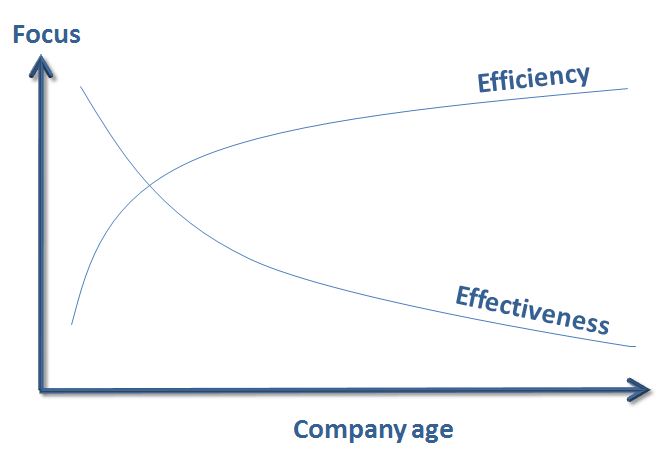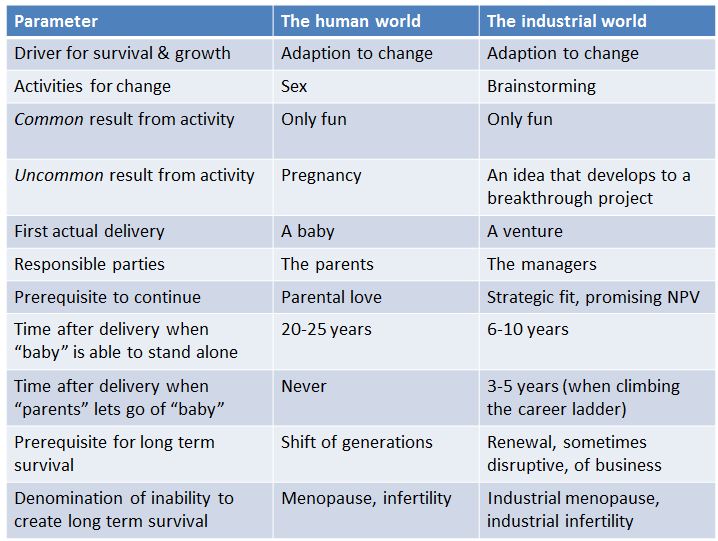By: Bengt Järrehult
It seems to be more or less a fact that the more mature a company is, the harder it is to produce something totally new that deviates substantially to what has been done earlier. In order to understand this phenomenon better Bengt Järrehult makes a comparison between human and industrial life, trying to elucidate the similarities and differences between the 2 worlds.
In the networks of innovation practitioners from mature multinational companies that I am a part of, I increasingly notice that the larger you are or rather the more mature you are as a company, the more difficult it is to provide the market with something that really is different and novel to what you are doing today. It seems that the task of mature company is to be an efficiency machine, where full focus is on doing things “right” – but to the cost of decreased focus on effectiveness, i.e. doing the “right” things.

Change as prerequisite for survival
Just as Charles Darwin wrote in 1857, the survival of species (and companies) is most dependent on the ability to change. This is more important than intelligence (Company world: smart leaders and staff) and strength (Company: financial power). This is well known in both worlds. Both worlds know or at least feel that the best way to ensure real change is to produce something new, so the humans engage in attempts to have a child with a fresh set of genes (Company: a new venture) by having sex (Company: brainstorming sessions). Usually nothing happens but the feeling that it has been a rewarding and fun event (Company: the same feeling) but every now and then a pregnancy (Company: a breakthrough project) starts. After 9 months (Company: 1 to 10 years) a baby (Company: a venture) is born, incapable of surviving on its own and in the need for major support 24 hours a day (Company: before each budget period). The prerequisite for survival of the baby is the care based on love from the parents (Company: Strategic fit, Net present Value of Business Plan) since they do not know what is coming to be of that baby. At this point it does not matter whether it is going to a be university drop out (Company: a flop), a beggar on the streets (Company: a bankrupt company) or a millionaire (Company: a new Google).
The child grows up and the parents (Company: the first line managers) take care of getting food (Company: budgeted funds) and ensures the kid gets good education (Company: management courses and training). When the kids get home from school (Company: project reviews) sometimes after a fight with other elderly kids (Company: established parts of the company)the parents are always there comforting and talking to the nasty opponents.
Differences between the 2 worlds
So until now, we have seen a lot of things in common between the human and the industrial world, but now the major differences start to occur. Parents are always parents and (in ideal cases) the same parents take care of the kids both during childhood and adolescence until they after heavy education can stand on their own after 20-25 years of tender loving care. The corresponding longevity for the company manager is 3-5 years because that is the maximum for a person to stay on a position if she/he has any thoughts of a career within the company.
Just as in the family life we usually have a stepfather or stepmother coming in, but they can be evil or at least not as understanding as the original parent to the mischievous and obnoxious behavior of the kid. This was the story when a child actually has been born in either of the 2 worlds, but the two worlds also have the effect that the longer you live, the more difficult is to become a parent. If you do not have children (Company: new sub-companies not doing what the mother company does) before 45 years of age for the females or the mother company it is inherently difficulty to have a child of your own.
We naturally come into the phase of what is called the human menopause, and what we in the industrial world may call the Industrial Menopause
We naturally come into the phase of what is called the human menopause, and what we in the industrial world may call the Industrial Menopause. You stand at the peak of your performance, having the peak of your reputation with an income statement unheard of before – but you do not have heirs in place when you eventually and inevitably will die, hopefully sometime in the distant future.
So, what to do when you find difficulties in getting pregnant and having babies on your own, and even if you would get one it is more frequent with miscarriages (Company: project turned down due to budget restrictions and a temporary dip in the stock exchange) at older age. Even if you would succeed to have a baby by using hormones (Company: external funding) and IVF (Company: external incubators) you let the baby come to a world that is so much tougher than what you expected and you cannot promise the future success (Company: a promising and proven business plan) of your baby.

You may be unable to bear a child of your own – but you can always adopt one
One option then stands out as a promising solution. Adoption! E.g. Open innovation full out! There are a lot of kids (Company: start-ups and SMEs) on the street or at institutions (Company: state owned incubators and accelerators). Adoption is also the solution to when managers leave pre-maturely before the venture is able to fly on ots own. You cannot force parents (Company: managers) to stay longer than they want, you hence must shorten the period of raising a child (Company: a venture) to be less than the age when the parent lets go (Company: 3-5 years). As in the eyes of the company it is only the years within the company that counts and new entrants come in at t0=0 years, irrespective of actual age of the entrant, the best option as I see it is getting a toddler (Company: a start up) or a teenager (Company: an SME) in.
The Toddlers are easier to raise, easier to adapt to your way of living the earlier you get them in.
The Toddlers are easier to raise, easier to adapt to your way of living the earlier you get them in, whereas teenagers have the advantage that you know quite well what to expect from them in the not to distant future. At the adolescence, you can tell a future drop out from a successful company builder…maybe. However this advantage come at a substantial cost – they have a will of their own and some nasty habits. They do not have the same preferences as you have and they do not obey orders.
The same things goes for SMEs. When an asymmetric merger happens as a large company buys a company that may be 100 times smaller or even less in size, they usually force key personnel of the acquired company to sign a contract where they are obliged to stay for a minimum of 2- 3 years. This contractual force usually is of limited benefit to any of the 2 parties. The new colleagues feel tied up in a world with so much more restrictions and difficulties with processes and decision boards whereas the old company colleagues may never fully trust the new because they intuitively know they will leave after the contract and start a company of their own that may be a competitor to them.
This is a problem that may have some solutions. Autonomy in a holding company set up is one, but then to cost of lack of control – if now that is a positive factor or not… (?)
What I would hope for are comments on ways to get around this. What are your thoughts?
» Download a PowerPoint Presentation for this blog!
About the author
 Bengt Järrehult is Fellow Scientist Innovation at SCA, a global hygiene products and paper company. He is also adjunct professor and visiting professor resp. at 2 departments of Lund University in Sweden. He is an avid reader of and presenter on the topics of innovation, especially on breakthrough innovation and the psychological hurdles that exist to achieve this, hurdles that we may or may not be aware of. He is of the opinion that most companies more or less know what to do to become more innovative. What they don’t know is what really hinders them from doing these measures…
Bengt Järrehult is Fellow Scientist Innovation at SCA, a global hygiene products and paper company. He is also adjunct professor and visiting professor resp. at 2 departments of Lund University in Sweden. He is an avid reader of and presenter on the topics of innovation, especially on breakthrough innovation and the psychological hurdles that exist to achieve this, hurdles that we may or may not be aware of. He is of the opinion that most companies more or less know what to do to become more innovative. What they don’t know is what really hinders them from doing these measures…
Photo: Illustration depicting a road traffic sign from shutterstock.com

